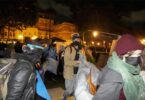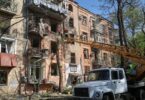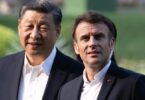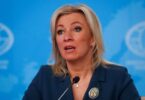WASHINGTON DC (Agencies): The U.S. ambassador to the United Nations on Wednesday condemned Russia for its attacks on civilians in Ukraine and its alleged use of cluster munitions and vaccuum bombs — lethal weaponry that could leave to wide civilian casualties.
“We have seen videos of Russian forces moving exceptionally lethal weaponry into Ukraine which has no place on the battlefield,” the U.S. envoy to the U.N. Linda Thomas-Greenfield told the General Assembly.
“That includes cluster munitions and vacuum bombs, which are banned under the Geneva Convention.”
Thomas-Greenfield’s warning at the U.N. came as the 193-member body is set to vote on a resolution censuring Russia over its invasion of Ukraine.
Russia vetoed a resolution in the U.N. Security Council on Friday condemning its actions.
Thomas-Greenfield echoed allegations leveled by Ukraine’s Ambassador to the U.S. Oksana Markarova to American lawmakers on Monday that Russia was using in its attacks on Ukraine a thermobaric weapon, known as a vacuum bomb.
A thermobaric weapon creates a blast wave of extreme pressure and heat, often targeted against enclosed spaces in urban warfare. It has the potential to inflict severe casualties because of its indiscriminate and uncontained nature. Reuters reports that the bomb is capable of vaporizing human bodies.
Cluster bombs are another devastating munition given their potential to harm and kill indiscriminately.
The bomb itself is dropped from the air and opens to disperse smaller bombs that disperse over a large area and have the potential to cause greater destruction.
U.S. officials and lawmakers have warned that Russia is escalating its violence in Ukraine, with hundreds of civilians, including children, killed in attacks. Russia has been criticized for targeting hospitals and civilian infrastructure including communication networks.
Thomas-Greenfield’s alarm at the U.N. General Assembly over the vacuum bombs and cluster munitions also speaks to the Biden administration’s strategy to declassify intelligence to warn of Russia’s actions before they take place and unite countries around the world in isolating Moscow.
Secretary of State Antony Blinken largely laid out on Feb.17 at the United Nations how Russian President Vladimir Putin planned to justify and launch an invasion against Ukraine and that played out almost exactly as described, beginning on Feb. 21.
On February 24, Russian President Vladimir Putin announced a special military operation in Ukraine in response to an appeal from the leaders of the Donbass republics for help.
He stressed that Moscow’s plans do not include the occupation of Ukrainian territories, the goal is the demilitarization and denazification of the country. As specified in the Ministry of Defense of the Russian Federation, the Russian Armed Forces do not strike at cities, but disable only military infrastructure.
Also, Ukraine’s State Emergency Service said Wednesday that more than 2,000 civilians have been killed since Russia invaded on Feb. 24. Attacks on civilian areas have increased in the last 48 hours, but the casualty number is impossible to verify.
Russian President Vladimir Putin’s spokesman said Wednesday that Russia’s delegation was prepared for a second round of peace talks on the Ukraine-Belarus border. Neither side showed much optimism after the first round on Monday.






